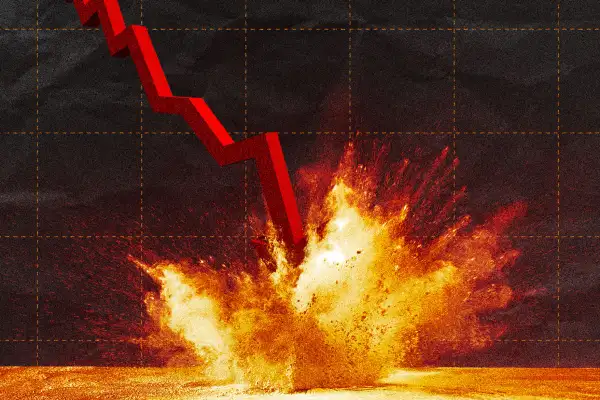Stock Market Sell-off: Why Investors Shouldn’t Panic About Monday's ‘Crash’
Money is not a client of any investment adviser featured on this page. The information provided on this page is for educational purposes only and is not intended as investment advice. Money does not offer advisory services.

The stock market continued its sell-off Monday, but the "crash" you may have heard about hasn't actually happened.
The Dow was down -2.74% in the first hour and a half of trading, and the S&P 500 and the tech-heavy Nasdaq Composite both fell more than -3%. This has compounded fears of a full-fledged stock market crash, with the major indices down about -2%, -7% and -12%, respectively, over the past month.
The effect has trickled into alternative assets, too. Gold and bitcoin prices are fell more than 1% and 5%, respectively, on Monday.
As the panic-selling ensues, Downdetector, a provider of network insights and connectivity intelligence, reported that several brokerages' online platforms were down, including Charles Schwab, Fidelity, Vanguard, TD Ameritrade, E-Trade, Interactive Brokers and Robinhood.
Clearly, investors are concerned. But whether or not they should be worried — or even paying close attention — is a matter of debate. Here's some historical context that can provide insights as to what is happening and what investors can expect.
Stock market pullback vs. correction vs. crash
So far, 2024 has seen two market downturns. The first, beginning on April 11 and ending April 19, saw the S&P 500 fall by -4.46%. In the second one, happening currently, the index has lost roughly -8% from July 16 to August 5. And while #stockmarketcrash is trending on social media, the hashtag isn't only inaccurate, it's fueling unwarranted speculation that could contribute to less experienced investors panic-selling.
Phrasing is important, and investors should understand the differences between a pullback, correction and crash:
- Stock market pullback: losses of 5% to 10%, often accompanied by the term "dip"
- Stock market correction: losses of 10% to 20%, but not enough to shift from a bull market to bear market
- Stock market crash: losses greater than 20%, when a bull market gives way to a bear market
By those definitions, the April 2024 sell-off didn't even classify as a pullback, let alone a correction. In the July and August sell-off, the S&P 500 — the benchmark widely used interchangeably to describe the overall market — is still within the parameters of a pullback rather than a correction and certainly not near a stock market crash.
But as demonstrated by the number of brokerages whose platforms crashed on August 5, panic seems to be contagious. Framing this current market environment within historical context can, hopefully, reassure unnerved investors.
Why is the stock market falling?
A considerable amount of the recent sell-off can be attributable to investors locking in gains. In other words, stocks are falling now partly because the market has been so strong in 2024.
The S&P 500 remains up around 9.5% for the year, with the Nasdaq Composite up nearly 10%. Those gains are more pronounced since last October, with the aforementioned indices having gained 26% and 29%, respectively.
Lingering macroeconomic concerns may also be a factor. "Globally, markets are experiencing quite the sell-off today following the U.S. jobs market report as well as the unwinding of the Japanese carry trade," Deni Koenhemsi, head of economic analysis at Morning Consult, said in a statement sent to Money.
July's weak jobs report showed slower-than-expected payroll growth and an uptick in unemployment. Meanwhile, the Federal Reserve's anticipated rate cut could be contingent on inflation further cooling — something that is not guaranteed between now and the FOMC's next meeting September 17 to September 18.
Historical context for stock market crashes
The last time the stock market saw a pullback was October 2023 when the benchmark index dropped by nearly 6%. That event lasted 10 market days; when it ended, the S&P 500 went on to gain 26% before April 2024's sell-off. After April's event, the index posted a 14% gain before the current pullback began.
In fact, pullbacks during bull markets occur far more often than many retail investors realize. Pullbacks normally occur three to four times a year and are considered healthy for the market. They also present buying opportunities for investors, as stocks sell at a discount.
The same goes for market corrections, which entail larger drops in the benchmark indices. The results of corrections also should instill confidence for patient investors who are cognizant that the market never goes up in a straight line.
"Similar to other sell-offs, this environment will present opportunities to some. Unless there are additional data points on U.S. inflation, spending or jobs that come below expectations, we expect this sell-off to not last long," said Koenhemsi.
According to investment bank Charles Schwab, "Since 1974, the S&P 500 has risen an average of more than 8% one month after a market correction bottom and more than 24% one year later."
Over the past 20 years, there have been 10 corrections, during which "stocks rose in most years, with positive returns in all but three years and an average gain of approximately 7%," per the Charles Schwab report.
Visualizing losses during market fluctuations typically doesn't instill confidence, and financial media — well aware of this — often relies on fear-mongering to increase engagement and ratings. Instead, investors can turn to the wisdom of revered minds like Warren Buffett, who has repeatedly said that "the stock market is the only place when the items go on sale, people run out of the store."
More from Money:
5 Ways Americans Are Using AI to Manage Their Money
Analysts Predict These 3 Stock Market Sectors Will Finish 2024 Strong





